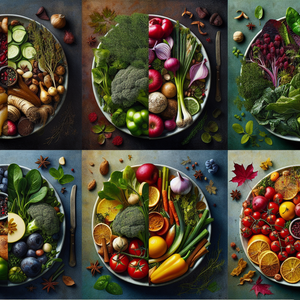Culinary Capital: The Surge of Chefs and Food Entrepreneurs in NYC

One of the most striking developments in New York City's culinary landscape is the emergence of innovative dining concepts. Chefs are increasingly embracing creativity, merging traditional recipes with modern techniques and diverse flavors. For instance, the rise of pop-up restaurants and food trucks has allowed chefs to experiment with unique menus without the overhead costs of a traditional establishment. Notable examples include the success of Smorgasburg, an open-air food market that features dozens of vendors each weekend, showcasing everything from gourmet donuts to artisanal ramen. Moreover, the trend of 'fine casual' dining has gained traction, allowing chefs to deliver high-quality cuisine in a more relaxed setting. Establishments like Loco Coco and By Chloe have gained popularity, enabling patrons to enjoy innovative dishes without the formalities of high-end dining. This shift not only caters to a broader audience but also reflects the evolving tastes and preferences of New Yorkers. According to a recent survey, fine casual dining has seen a 30% increase in popularity among city dwellers, pointing to a growing desire for accessible yet sophisticated culinary experiences.
Culinary Entrepreneurs and the Startup Culture
The rise of food entrepreneurship in NYC is closely linked to the city's vibrant startup culture. Many chefs and culinary professionals are taking the leap into entrepreneurship, launching their own brands and products. This has led to the emergence of various food startups, from artisanal ice creams to gourmet meal delivery services. Companies like Freshly and Blue Apron have capitalized on the demand for convenient yet high-quality meals, highlighting how food entrepreneurs are responding to the fast-paced lifestyle of city dwellers. Moreover, NYC's diverse population plays a crucial role in this culinary explosion. Chefs from different cultural backgrounds are introducing authentic flavors and ingredients, creating a rich tapestry of dining options. Restaurants like Kaya, which offers traditional Caribbean fare with modern twists, showcase how cultural heritage can be both preserved and innovated. This blending of traditions is not merely a trend; it reflects the essence of New York City as a global hub where culinary boundaries are continually redefined.
Food Festivals and Culinary Tourism
Another significant aspect of NYC’s culinary surge is the rise of food festivals and culinary tourism. Events like the New York City Wine & Food Festival and Smorgasburg not only celebrate the city's culinary diversity but also attract food enthusiasts from around the world. These festivals provide a platform for chefs and food entrepreneurs to showcase their creations, fostering community engagement and collaboration. Culinary tourism has become a vital part of the city's economy, with tourists increasingly seeking unique dining experiences. Restaurants are responding by offering immersive culinary adventures that often include local ingredients and authentic preparation methods. For instance, Food on Foot offers guided tours that combine sightseeing with local food tastings, allowing visitors to explore the city through its flavors. This not only enhances the tourist experience but also supports local businesses, emphasizing the interconnectedness of the culinary and tourism sectors.
The Cultural Significance of Food
Food is deeply intertwined with culture, and in NYC, it serves as a reflection of the city's diversity and history. The culinary surge has revitalized neighborhoods, turning once-overlooked areas into gastronomic hubs. For example, the Lower East Side has become a hotspot for trendy eateries that pay homage to its immigrant history while embracing modern culinary trends. Moreover, food has the power to bring people together, fostering connections across different communities. Events such as Taste of the Nation aim to combat hunger by uniting chefs and diners to raise funds for local food relief organizations, highlighting the social responsibility intertwined with the culinary scene. This sense of community is further evidenced by the collaboration between chefs and local farmers, emphasizing a farm-to-table ethos that is increasingly prevalent in NYC’s dining establishments.
The surge of chefs and food entrepreneurs in New York City is a testament to the city’s ever-evolving culinary landscape. With innovative dining concepts, a thriving startup culture, and a commitment to cultural significance, NYC has solidified its status as a global culinary capital. As chefs continue to push boundaries and redefine the dining experience, the city not only nourishes its residents but also inspires food lovers worldwide. The future of NYC's culinary scene looks bright, promising even more exciting developments and delicious discoveries on the horizon. As the most popular job in New York City continues to be in the culinary field, it is clear that the appetite for innovation and quality in food will only grow stronger.
Executive Chef
Le Bernardin, Per Se
Core Responsibilities
Oversee kitchen operations, including menu planning and food preparation.
Manage staff recruitment, training, and performance evaluations.
Ensure compliance with health and safety regulations.
Required Skills
Extensive culinary experience with a focus on menu development.
Strong leadership and team management skills.
Proficiency in food cost management and inventory control.
Unique Qualifications
Culinary degree from a recognized institution and several years of experience in high-pressure kitchen environments.
Food and Beverage Director
The Ritz-Carlton, Union Square Hospitality Group
Core Responsibilities
Develop and implement strategic plans for food and beverage operations.
Collaborate with culinary teams to create seasonal menus and beverage pairings.
Monitor financial performance and manage budgets for food and beverage departments.
Required Skills
Strong analytical skills to assess market trends and customer preferences.
Excellent communication and negotiation skills for vendor management.
Proven track record in hospitality management.
Unique Qualifications
Bachelor’s degree in Hospitality Management or a related field, along with several years of experience in food and beverage management.
Culinary Marketing Specialist
Blue Apron
Core Responsibilities
Develop and execute marketing campaigns to promote food products and dining experiences.
Collaborate with chefs and restaurateurs to create compelling content for social media and other platforms.
Analyze market trends to identify opportunities for new culinary products or services.
Required Skills
Strong understanding of digital marketing and social media platforms.
Creative skills for content creation, including photography and copywriting.
Ability to work collaboratively with culinary teams and external partners.
Unique Qualifications
Background in marketing or communications, preferably within the food industry, and experience with brand management.
Food Science Researcher
Nestlé, The Food Innovation Center
Core Responsibilities
Conduct research and experiments to improve food quality, safety, and processing techniques.
Collaborate with culinary professionals to develop innovative food products.
Analyze data and present findings to stakeholders within the food industry.
Required Skills
Strong background in chemistry, biology, or food science.
Proficiency in laboratory techniques and food safety regulations.
Ability to communicate complex scientific concepts to non-technical audiences.
Unique Qualifications
Advanced degree in Food Science or a related field, with experience in product development.
Restaurant Operations Manager
Shake Shack
Core Responsibilities
Oversee daily operations of the restaurant to ensure consistent quality of food and service.
Implement operational policies and procedures to enhance efficiency.
Monitor financial performance and manage labor costs and inventory.
Required Skills
Strong organizational and multitasking abilities.
Excellent customer service skills and conflict resolution capabilities.
Knowledge of POS systems and restaurant management software.
Unique Qualifications
Experience in restaurant management, preferably with a focus on operations, and a degree in Hospitality Management or Business Administration.


